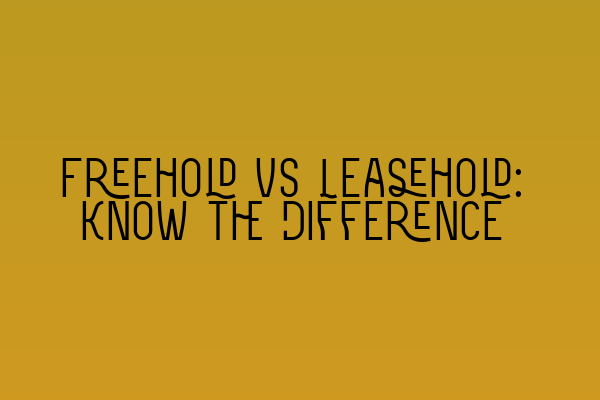Freehold vs Leasehold: Know the Difference
When it comes to property ownership, there are two main types that you should be familiar with: freehold and leasehold. Each type has its own set of rights and responsibilities, and it’s important to understand the differences before you decide to buy or sell a property. In this article, we will explain the key distinctions between freehold and leasehold and help you make an informed decision. Let’s dive in!
What is Freehold?
Freehold is the complete and absolute ownership of a property and the land it stands on. When you purchase a freehold property, you become the outright owner, with exclusive rights to use and occupy the property as you see fit. You are not subject to any time limitations or third-party control. This type of ownership is typically associated with houses, although some apartments and commercial properties can also be freehold.
One of the key advantages of freehold ownership is that you have complete control of the property, allowing you to modify, renovate, or sell it without seeking permission from anyone else. Moreover, you are not required to pay ground rent or service charges to a landlord, which can save you money in the long run.
However, being a freeholder also means that you are solely responsible for the property’s maintenance and any repairs that may arise. Therefore, it’s crucial to budget for these potential expenses and be prepared for the financial responsibilities that come with owning a freehold property.
What is Leasehold?
Leasehold, on the other hand, is a form of property ownership where you have the right to occupy and use a property for a specified period of time, as stated in the lease agreement. In leasehold ownership, you do not own the land but instead hold a lease from the freeholder, who owns the land and any communal areas.
Leasehold ownership is commonly associated with apartments, flats, and some houses. When you buy a leasehold property, you essentially enter into a contractual agreement with the freeholder, known as the landlord. This agreement outlines your rights and obligations as a leaseholder, as well as any ground rent, service charges, and maintenance responsibilities you may have.
One important aspect to consider with leasehold ownership is the length of the lease. Leases can vary in duration, and it’s crucial to understand how much time is remaining on the lease before you commit to purchasing the property. As the lease approaches its expiration date, the value of the property may decrease, making it harder to secure a mortgage or sell the property in the future.
Understanding the Differences
Now that we have defined both freehold and leasehold, let’s break down the key differences between the two:
- Ownership: Freehold grants you absolute ownership, while leasehold provides a temporary right to occupy the property.
- Responsibilities: Freehold owners are solely responsible for maintenance and repairs, whereas leasehold owners often have obligations to contribute to communal expenses.
- Length of Ownership: Freehold ownership is indefinite, while leasehold ownership is limited to the period stated in the lease.
- Ground Rent and Service Charges: Freehold owners are not required to pay ground rent or service charges, whereas leasehold owners typically have these financial obligations.
- Selling the Property: Freehold properties are generally easier to sell, while leasehold properties may require additional considerations such as lease length and ongoing obligations.
Which One is Right for You?
Deciding between freehold and leasehold ownership depends on your specific circumstances and preferences. Freehold ownership offers more autonomy and control over the property, making it suitable for those who value independence and want to avoid ongoing expenses.
On the other hand, leasehold ownership may be more affordable upfront, as the purchase price is often lower than that of a freehold property. If you are looking to buy an apartment or flat, leasehold is the more common type of ownership, so it may be the only option available in certain areas or developments.
It’s important to evaluate your long-term plans, financial situation, and the implications of each type of ownership before making a decision. Consulting with a property solicitor can provide you with expert advice tailored to your specific needs.
Now that you have a clear understanding of the differences between freehold and leasehold, you can make an informed decision when it comes to buying or selling a property. Remember, it’s always wise to seek professional advice from a property lawyer to ensure you navigate the process smoothly and protect your interests.
If you want to learn more about property law or prepare for your upcoming SQE exams, take a look at these related articles:
